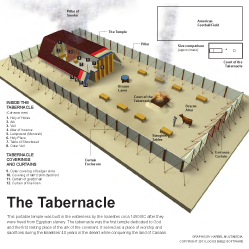17:1–18:31 The final five chapters of Judges (chs. 17–21) do not offer an account of any additional judges; rather, they provide a glimpse into life during the period. These chapters recount two stories. The first is focused on the idolatry of an Ephraimite named Micah and his encounter with the tribe of Dan (chs. 17–18). The story of Micah recounts how the man sets up a personal shrine with an idol and an ephod and recruits a Levite to serve as his priest. The men of Dan pass through on their way to find new territory and take Micah’s idol, his household gods, his ephod, and his priest. |
17:1 ; his name was Micah The name “Micah” means “Who is like Yahweh?,” reflecting his parents’ faith in Yahweh.
17:2 eleven hundred pieces of silver that were taken from you, and about which Micah confesses to stealing silver from his mother. The amount echoes Judg 16:5, where the Philistines offer Delilah 1,100 pieces of silver to betray Samson.
Blessed be my son by Yahweh Micah’s mother uses the divine name, Yahweh. She is therefore probably a worshiper of Yahweh, though likely not one who worships Yahweh exclusively.
17:3 I will certainly consecrate to Yahweh the pieces of silver The woman dedicates the silver to Yahweh for Micah to make an idol. Micah’s mother apparently sees no problem with dedicating 200 pieces of the silver to make an idol for Yahweh, a clear violation of Exod 20:4–5 and Deut 5:8–9.
an idol of cast metal An idol carved from wood subsequently covered with silver.
17:4 the house of Micah Micah keeps the idol in his home. In Judg 18:24 he will bemoan the loss of his gods. The entire description illustrates the level of spiritual ignorance and self-styled faith made explicit in v. 6.
17:5 a shrine Being the “house of God/a god.” Micah sets up his own household temple.
teraphim Likely figurines of ancestors or other objects connected with ancestors. The text does not mention how Micah used the household gods or the ephod.
who became a priest for him Since Micah appoints his own son as priest, he may have seen himself in the role of a high priest.
17:6 each one did what was right in his own eyes In chs. 17–21, the familiar refrain of the narrative that the Israelites did evil before Yahweh or did what was right in their own eyes (see 2:11) leads to a new expression that highlights the near anarchy that persisted without a king in Israel (18:1; 19:1; 21:25). Religious apostasy is now connected to a lack of central governance.
17:7 a young man from Bethlehem in Judah This man—a Levite —comes from Judah,
—comes from Judah, whereas Micah was from Ephraim. See note on vv. 1–13; and note on v. 9.
whereas Micah was from Ephraim. See note on vv. 1–13; and note on v. 9.
17:9 I am a Levite from Bethlehem in Judah See v. 7 and note; and v. 10 and note. The Levite’s name is Jonathan (18:30).
17:10 to me a father and a priest A spiritual leader.
ten pieces of silver a year Normally priests were supported materially from the sacrifices brought to the tabernacle, so Micah’s offer of a small stipend is not suspect.
17:11 agreed to stay with the man See v. 10 and note. The Levite should know that Yahweh should be worshiped only at the tabernacle, the central sanctuary (Deut 12). Thus, the Levite’s consent to this is worse than Micah’s request.
the central sanctuary (Deut 12). Thus, the Levite’s consent to this is worse than Micah’s request.
became as one of his sons Indicates that the two have a very good relationship.
17:12 appointed This term can refer to appointment to a priestly office (e.g., Exod 29:29), but here, it may also refer to Micah paying the Levite.

|
About Faithlife Study BibleFaithlife Study Bible (FSB) is your guide to the ancient world of the Old and New Testaments, with study notes and articles that draw from a wide range of academic research. FSB helps you learn how to think about interpretation methods and issues so that you can gain a deeper understanding of the text. |
| Copyright |
Copyright 2012 Logos Bible Software. |
| Support Info | fsb |
 Loading…
Loading…

